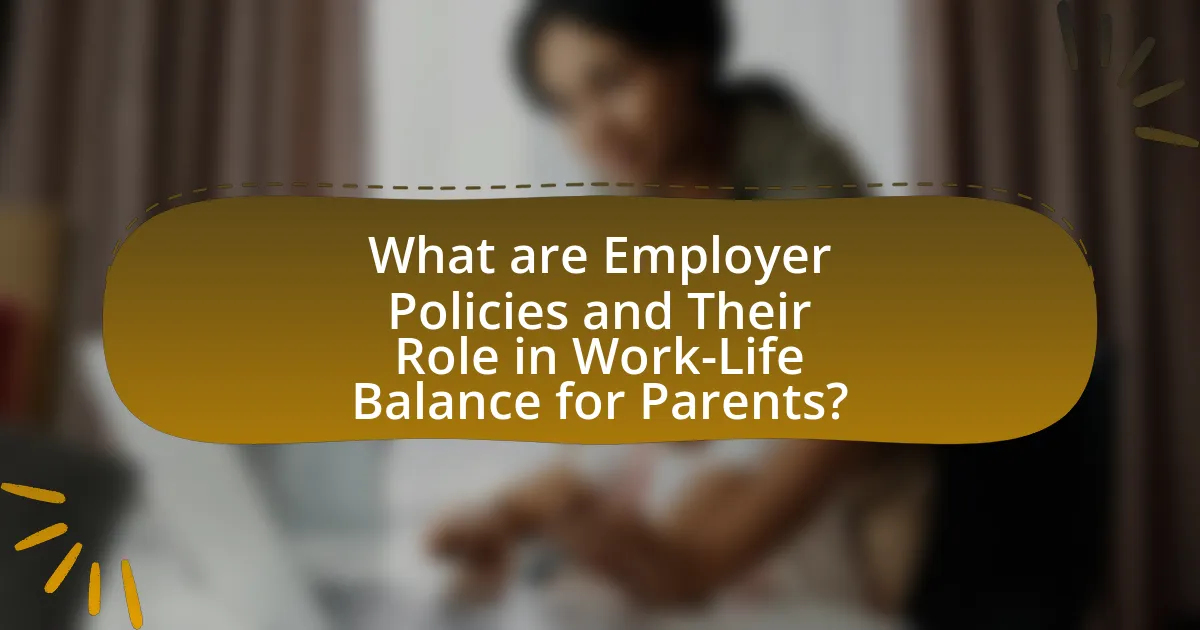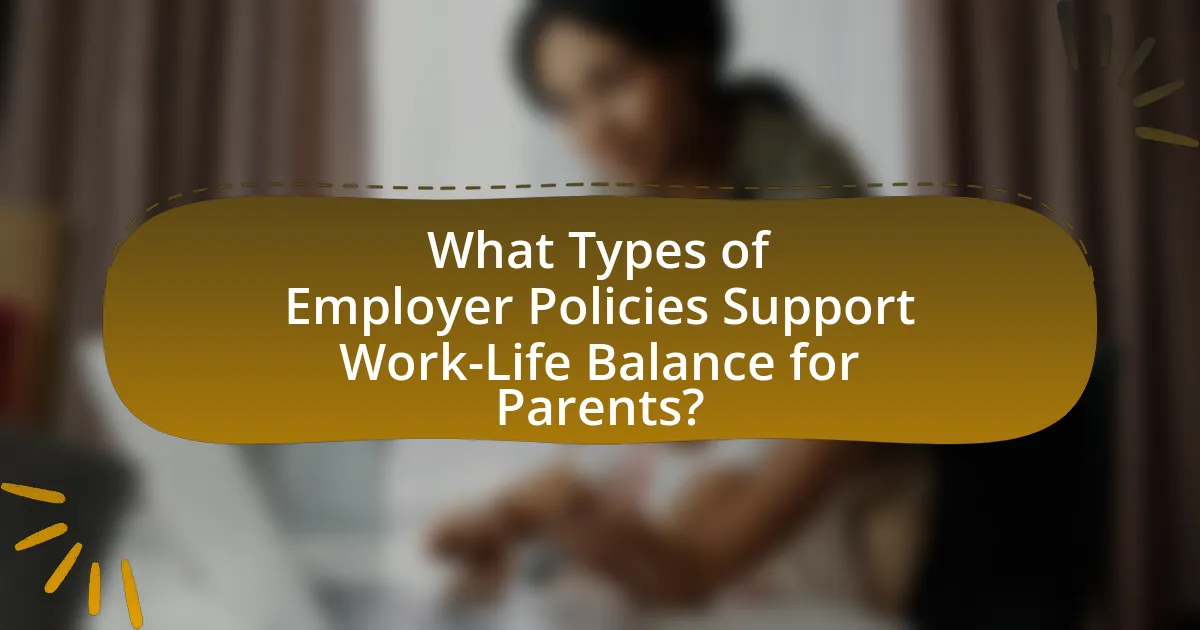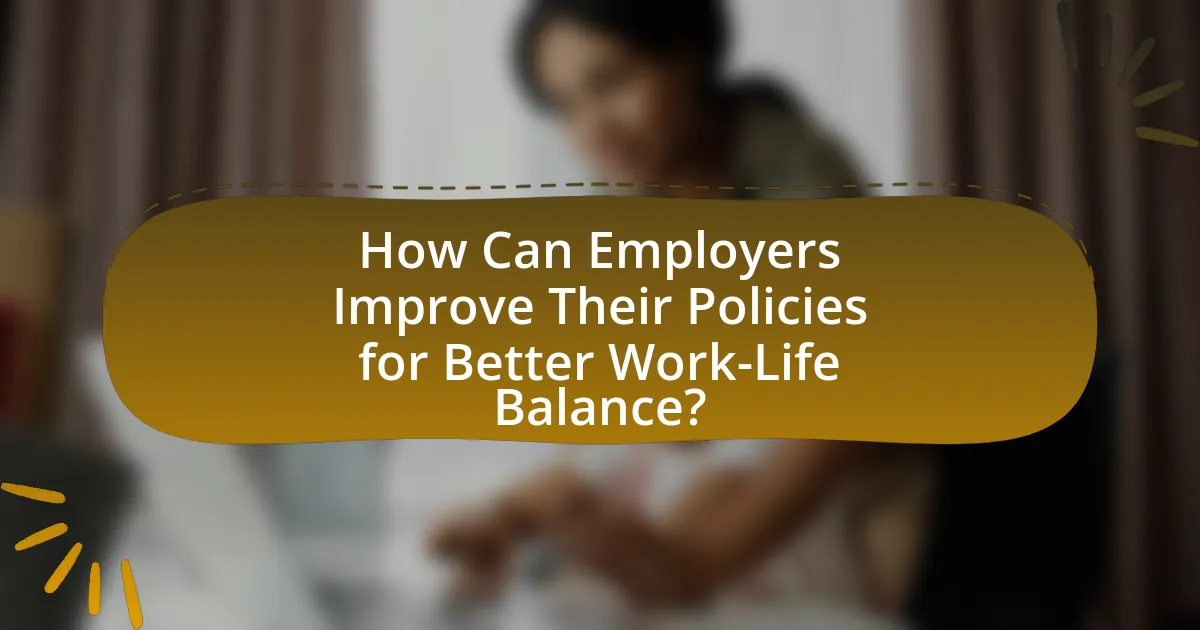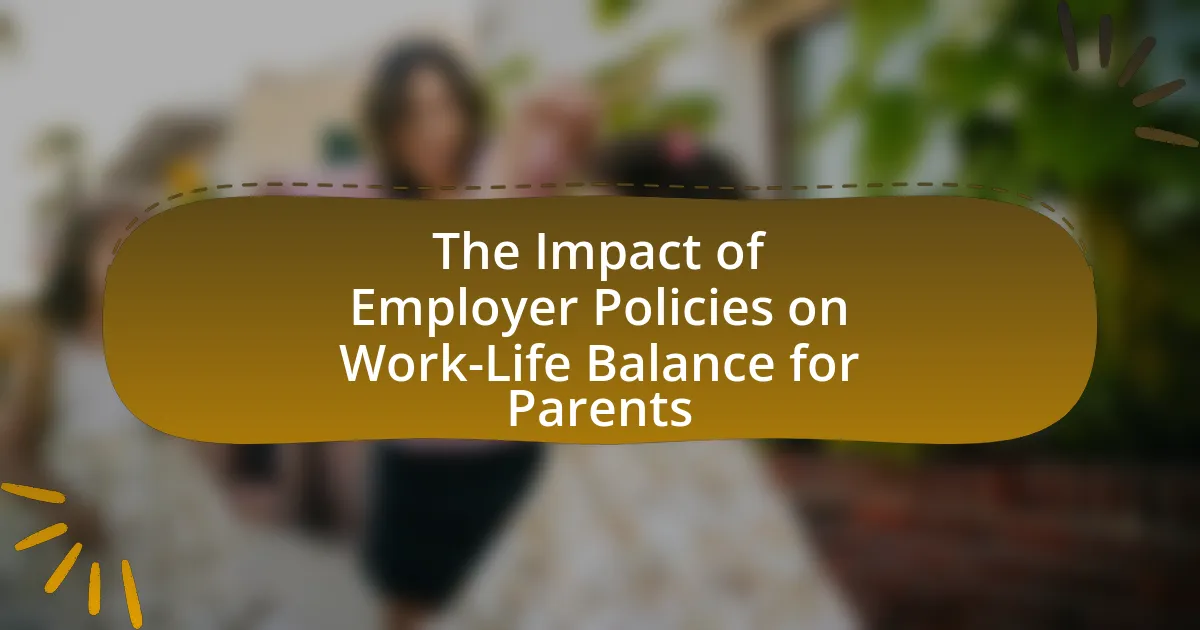Employer policies are formal guidelines established by organizations that significantly influence work-life balance for parents. These policies, which include flexible work arrangements, parental leave, and childcare assistance, are essential for enabling parents to manage their professional and family responsibilities effectively. Research shows that supportive employer policies lead to higher employee satisfaction, retention rates, and improved mental health outcomes for parents and their children. The article explores the impact of various employer policies on work-life balance, the psychological effects of poor balance, and strategies for employers to enhance support for working parents. Additionally, it discusses the importance of feedback and training in shaping effective policies that foster a positive workplace environment.

What are Employer Policies and Their Role in Work-Life Balance for Parents?
Employer policies are formal guidelines established by organizations that govern workplace practices, including those related to work-life balance for parents. These policies play a crucial role in supporting parents by providing flexible work arrangements, parental leave, and childcare assistance, which can significantly enhance their ability to manage both professional responsibilities and family life. Research indicates that companies with supportive policies experience higher employee satisfaction and retention rates; for instance, a study by the Society for Human Resource Management found that 90% of employees reported that flexible work options improved their work-life balance. Thus, effective employer policies are essential for fostering a supportive environment that enables parents to thrive both at work and at home.
How do employer policies influence work-life balance for parents?
Employer policies significantly influence work-life balance for parents by establishing frameworks that support flexible working arrangements, parental leave, and childcare assistance. For instance, companies that offer flexible hours or remote work options enable parents to better manage their professional responsibilities alongside family obligations, leading to reduced stress and increased job satisfaction. Research from the Society for Human Resource Management indicates that organizations with robust family-friendly policies experience lower turnover rates and higher employee engagement, demonstrating the positive impact of such policies on work-life balance.
What specific policies are most impactful for parents?
The most impactful policies for parents include paid parental leave, flexible work arrangements, and affordable childcare support. Paid parental leave allows parents to take time off work to care for their newborns without financial strain, which is crucial for bonding and early child development. Research indicates that countries with generous parental leave policies, such as Sweden, see higher rates of maternal and child health outcomes. Flexible work arrangements, such as remote work options and adjustable hours, enable parents to better manage their work-life balance, leading to increased job satisfaction and reduced stress. A study by the American Psychological Association found that flexible work policies significantly improve employee well-being. Lastly, affordable childcare support is essential, as it alleviates the financial burden on parents and allows them to return to work more easily. According to the Center for American Progress, access to affordable childcare can increase workforce participation among parents, particularly mothers.
How do these policies vary across different industries?
Employer policies regarding work-life balance for parents vary significantly across different industries due to factors such as regulatory requirements, workforce demographics, and operational demands. For instance, the technology sector often offers flexible work hours and remote work options to attract talent, reflecting its competitive nature and the need for innovation. In contrast, the healthcare industry may have more rigid scheduling due to the necessity of continuous patient care, which can limit flexibility for parents. Additionally, industries like education typically provide structured schedules aligned with school calendars, allowing for predictable time off, which can benefit parents. These variations are supported by studies indicating that sectors with high employee turnover, such as retail, tend to implement more family-friendly policies to retain staff, while industries with stable employment, like finance, may prioritize performance metrics over flexibility.
Why is work-life balance important for parents?
Work-life balance is important for parents because it directly affects their well-being and the overall family dynamics. When parents achieve a healthy work-life balance, they experience reduced stress levels, which enhances their mental health and allows them to engage more positively with their children. Research indicates that parents who maintain this balance are more likely to foster a nurturing environment, leading to better emotional and developmental outcomes for their children. For instance, a study published in the Journal of Family Psychology found that parents with a good work-life balance reported higher levels of satisfaction in their parenting roles and improved relationships with their children. This balance not only benefits the parents but also contributes to a more stable and supportive family environment.
What are the psychological effects of poor work-life balance on parents?
Poor work-life balance significantly impacts parents’ psychological well-being, leading to increased stress, anxiety, and depression. Research indicates that parents experiencing a lack of balance often report feelings of being overwhelmed, which can result in emotional exhaustion and decreased life satisfaction. A study published in the Journal of Occupational Health Psychology found that parents with poor work-life balance are more likely to experience burnout, which negatively affects their mental health and family relationships. Furthermore, the American Psychological Association highlights that chronic stress from work-life imbalance can lead to long-term psychological issues, including anxiety disorders and depression, particularly among parents who struggle to meet both work and family demands.
How does work-life balance affect children’s well-being?
Work-life balance significantly affects children’s well-being by influencing their emotional and psychological development. When parents maintain a healthy work-life balance, they are more available for quality interactions with their children, which fosters secure attachments and emotional stability. Research indicates that children with engaged parents exhibit better social skills and lower levels of anxiety. For instance, a study published in the Journal of Family Psychology found that children whose parents reported a positive work-life balance had higher levels of well-being and lower behavioral problems. This correlation underscores the importance of employer policies that support work-life balance, as they directly contribute to healthier family dynamics and improved outcomes for children.

What Types of Employer Policies Support Work-Life Balance for Parents?
Employer policies that support work-life balance for parents include flexible work arrangements, parental leave, and childcare assistance. Flexible work arrangements, such as remote work options and adjustable hours, allow parents to manage their professional responsibilities alongside family needs. Parental leave policies, which often provide paid time off for new parents, enable individuals to bond with their children without the stress of job insecurity. Additionally, childcare assistance programs, including on-site childcare or subsidies for external care, alleviate the burden of childcare costs and logistics. Research indicates that companies offering these policies experience higher employee satisfaction and retention rates, demonstrating their effectiveness in promoting work-life balance for parents.
What are the most common family-friendly policies implemented by employers?
The most common family-friendly policies implemented by employers include flexible work hours, parental leave, remote work options, childcare assistance, and employee assistance programs. Flexible work hours allow employees to adjust their schedules to better accommodate family needs, which has been shown to improve job satisfaction and reduce stress. Parental leave policies provide time off for new parents, with many companies offering paid leave to support family bonding and recovery. Remote work options enable employees to work from home, facilitating a better work-life balance. Childcare assistance, such as on-site childcare or subsidies, helps alleviate the financial burden of childcare costs. Employee assistance programs offer resources for mental health and family support, contributing to overall employee well-being. These policies are increasingly recognized as essential for attracting and retaining talent, as evidenced by studies showing that companies with such policies experience higher employee engagement and lower turnover rates.
How do flexible working hours contribute to work-life balance?
Flexible working hours significantly enhance work-life balance by allowing employees to tailor their schedules to meet personal and family needs. This adaptability enables parents to manage childcare responsibilities, attend school events, or handle emergencies without compromising their professional obligations. Research from the American Psychological Association indicates that flexible work arrangements lead to reduced stress and increased job satisfaction, which are crucial for maintaining a healthy work-life balance. Furthermore, a study published in the Journal of Occupational Health Psychology found that employees with flexible hours reported higher levels of well-being and lower levels of burnout, reinforcing the positive impact of such policies on family life and overall mental health.
What role does parental leave play in supporting parents?
Parental leave plays a crucial role in supporting parents by providing them with the necessary time to bond with their newborns and adjust to new family dynamics. This time off allows parents to focus on caregiving without the stress of work obligations, which is essential for both physical and mental well-being. Research indicates that parental leave can lead to improved maternal and child health outcomes, as well as increased parental involvement in early child development. For instance, a study published in the Journal of Health Economics found that longer parental leave is associated with lower infant mortality rates and better health for children in their early years. Thus, parental leave is a vital policy that enhances the overall well-being of families.
How do remote work options impact work-life balance for parents?
Remote work options significantly enhance work-life balance for parents by providing flexibility in managing their professional and personal responsibilities. This flexibility allows parents to create schedules that accommodate childcare, school activities, and family time, reducing stress and improving overall well-being. Research from the Harvard Business Review indicates that remote work can lead to a 20% increase in productivity, as parents can work during their most effective hours while also attending to family needs. Additionally, a survey by FlexJobs found that 73% of parents reported improved work-life balance due to remote work arrangements, highlighting the positive impact of such policies on their daily lives.
What are the benefits of remote work for parents?
Remote work offers significant benefits for parents, primarily by providing flexibility in managing their work and family responsibilities. This flexibility allows parents to create a schedule that accommodates school drop-offs, pick-ups, and other family activities, leading to improved work-life balance. Research from the Stanford Graduate School of Business indicates that remote workers are 13% more productive than their in-office counterparts, which can lead to better job performance while still attending to family needs. Additionally, remote work eliminates commuting time, allowing parents to spend more quality time with their children, which is crucial for family bonding and child development.
What challenges do parents face when working remotely?
Parents face several challenges when working remotely, including balancing work responsibilities with childcare, managing distractions, and maintaining productivity. The need to supervise children while completing work tasks often leads to interruptions, which can hinder focus and efficiency. According to a study by the Pew Research Center, 46% of parents reported difficulties in managing work and family responsibilities during remote work, highlighting the struggle to create a conducive work environment at home. Additionally, the lack of clear boundaries between work and personal life can lead to increased stress and burnout, as parents may find it hard to disconnect from work after hours.

How Can Employers Improve Their Policies for Better Work-Life Balance?
Employers can improve their policies for better work-life balance by implementing flexible work arrangements, such as remote work options and adjustable hours. Research indicates that companies offering flexible schedules report higher employee satisfaction and productivity, with a Gallup study showing that 54% of employees would leave their current job for one that offers more flexibility. Additionally, providing parental leave and support programs can significantly enhance work-life balance, as evidenced by a report from the Society for Human Resource Management, which found that organizations with robust parental leave policies experience lower turnover rates and higher employee engagement.
What strategies can employers adopt to enhance work-life balance for parents?
Employers can enhance work-life balance for parents by implementing flexible work arrangements, such as remote work options and adjustable hours. Research indicates that 80% of employees report improved job satisfaction when given flexibility in their schedules, which directly correlates to better work-life balance. Additionally, providing parental leave policies that exceed legal requirements can significantly support parents in managing their responsibilities. A study by the Society for Human Resource Management found that companies offering generous parental leave see a 25% increase in employee retention. Furthermore, establishing on-site childcare services or partnerships with local childcare providers can alleviate the stress of finding care, thereby allowing parents to focus more on their work. These strategies collectively contribute to a supportive work environment that acknowledges and addresses the unique challenges faced by working parents.
How can feedback from employees shape better policies?
Feedback from employees can shape better policies by providing insights into their needs and experiences, which helps organizations tailor policies that enhance work-life balance. When employees share their perspectives, companies can identify gaps in existing policies and make data-driven adjustments that directly address employee concerns. For instance, a study by Gallup found that organizations that actively seek employee feedback and implement changes based on that feedback see a 14% increase in employee engagement and a 20% increase in productivity. This demonstrates that employee input is crucial for developing effective policies that support work-life balance, ultimately leading to a more satisfied and productive workforce.
What role does training and awareness play in policy effectiveness?
Training and awareness are critical for enhancing policy effectiveness, particularly in the context of employer policies on work-life balance for parents. Effective training equips employees and management with the necessary skills and knowledge to understand and implement policies correctly, ensuring that they are utilized to their full potential. Awareness campaigns inform stakeholders about the existence and benefits of these policies, fostering a culture that values work-life balance. Research indicates that organizations with comprehensive training programs see a 25% increase in policy compliance and employee satisfaction, demonstrating a direct correlation between training, awareness, and the successful implementation of policies aimed at improving work-life balance for parents.
What are the potential consequences of inadequate employer policies on parents?
Inadequate employer policies on parents can lead to increased stress and decreased job satisfaction. When employers fail to provide sufficient parental leave, flexible work arrangements, or support for childcare, parents often struggle to balance their professional and personal responsibilities. This imbalance can result in higher absenteeism rates, reduced productivity, and increased turnover, as parents may seek employment with more supportive policies. Research indicates that companies with robust family-friendly policies experience lower employee turnover and higher employee engagement, highlighting the importance of adequate support for parents in the workplace.
How can poor work-life balance lead to employee turnover?
Poor work-life balance can lead to employee turnover by increasing stress and job dissatisfaction among employees. When employees struggle to manage their professional and personal responsibilities, they often experience burnout, which diminishes their engagement and productivity. Research indicates that 76% of employees report that work-life balance is a significant factor in their job satisfaction, and a lack of it can prompt them to seek employment elsewhere. Additionally, companies with poor work-life balance policies may face higher turnover rates, as employees prioritize their well-being and seek environments that support their personal lives.
What impact does it have on overall workplace morale?
Employer policies that support work-life balance for parents significantly enhance overall workplace morale. When organizations implement flexible work arrangements, parental leave, and childcare support, employees feel valued and respected, leading to increased job satisfaction. Research from the Society for Human Resource Management indicates that companies with family-friendly policies experience lower turnover rates and higher employee engagement, demonstrating a direct correlation between supportive policies and positive workplace morale.
What best practices can parents follow to navigate employer policies effectively?
Parents can effectively navigate employer policies by thoroughly understanding their rights and available benefits. Familiarizing themselves with company policies regarding parental leave, flexible work arrangements, and childcare support enables parents to make informed decisions. Research indicates that companies with clear parental leave policies see higher employee satisfaction and retention rates, highlighting the importance of awareness. Additionally, engaging in open communication with supervisors about needs and expectations fosters a supportive work environment, which is crucial for balancing work and family responsibilities.
How can parents advocate for better work-life balance in their workplace?
Parents can advocate for better work-life balance in their workplace by actively engaging in discussions with management about flexible work arrangements. Research indicates that organizations with flexible policies report higher employee satisfaction and retention rates, demonstrating the effectiveness of such advocacy. Parents can present data showing that flexible hours or remote work options lead to increased productivity and morale, thereby benefiting the company as well. Additionally, forming or joining employee resource groups focused on work-life balance can amplify their voices and create a collective push for policy changes.
What resources are available for parents seeking support in work-life balance?
Parents seeking support in work-life balance can access various resources, including employee assistance programs (EAPs), flexible work arrangements, and parenting support groups. EAPs often provide counseling services and resources for managing stress and balancing responsibilities, which can significantly aid parents. Flexible work arrangements, such as remote work options and adjustable hours, allow parents to tailor their work schedules to better fit family needs. Additionally, parenting support groups, both online and in-person, offer community and shared experiences, helping parents navigate challenges. Research indicates that organizations implementing supportive policies, such as these resources, see improved employee satisfaction and retention, highlighting their effectiveness in promoting work-life balance.
